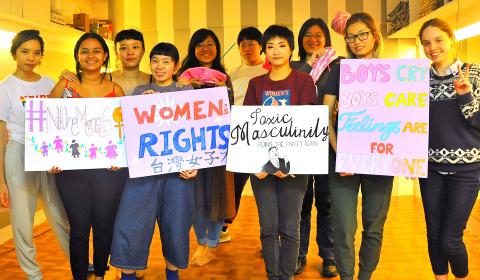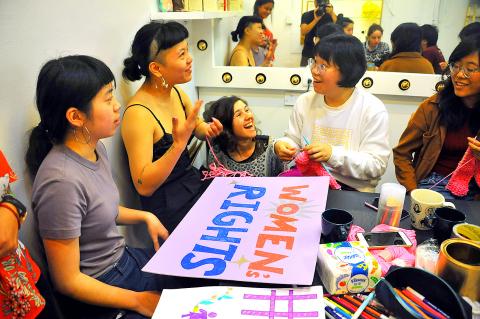It’s a simple yes or no question, but it can spark a long discussion when it’s brought up: Is Taiwan close to achieving gender equality?
Some may think it’s a no brainer. Taiwan has comprehensive gender equality and protection laws, high international marks in women’s rights indices and, of course, a female president.
But it’s exactly these achievements that have led some to think that Taiwan is doing enough says Joy Chang (張友慈), co-organizer of Women’s March Taiwan.

Photo: Han Cheung, Taipei Times
“How can there be inequality when there are laws in place?” Chang asks rhetorically. “Harassment in the workplace doesn’t always get to the point where one has to take legal action. And the law doesn’t cover everything.”

Photo: Han Cheung, Taipei Times
Under the broad theme of recognizing latent discrimination and marching for equality, Chang and other women’s march organizers will tomorrow meet at Liberty Square at 4:30pm and march to the Red Room International Village.
While the organization holds events year round, they ramped up the game this month with a pre-march “Women’s Rights 101” forum on women’s rights, various related workshops.
A post-march Celebrating Women in Taipei art show and festival will be held at the Red Room on Sunday.
IS THERE EQUALITY?
Annie Chang (張琬琪), a researcher at the Foundation of Women’s Rights Promotion and Development (婦女權益促進發展基金會) says it’s easy to discuss women’s rights in the public sphere, with non-controversial items such as sexual harassment prevention laws, she says.
“But how about in the private sphere? Do we have an environment where all women can choose how they want to live?” she asks. “On a certain level, we don’t seem to have progressed that much.”
Chang acknowledges that Taiwan has come a long way in certain respects — from her grandfather never doing household chores, to her father doing only what her mother tells him to do, to her brother-in-law volunteering to share the duties.
But from pressure to conform to preconceived gender roles to misogynist groups on the Internet to the lack of women in the ever-important science, technology, engineering and mathematics (STEM) field, the discussion led to example after example of the inequalities that still exist today.
Fellow researcher Helen Lee (李立璿) says that the international gender equality indices often measure items that Taiwan does excel at: equal opportunities for education and numbers of women in the workforce.
“But there’s still a disparity with how people really feel and what national policy indicates,” she says.
Representation and participation is a big part of it, as Lee’s foundation has launched a number of initiatives to get more women into the STEM field.
“The world will be relying more and more on technology in the future,” she says. “But if women don’t have a voice in these fields, we’ll fall behind and lose our chance to have a voice. It’s very serious especially because Taiwan is known for its high-tech industry.”
Fan Ching (范情), chairwoman of the Taiwan Women’s Film Association, says that there is a dearth of female directors and producers, which is detrimental to the filmmaking industry. And because making movies requires considerable capital, women often may miss out because an investor did not believe in a woman’s ability to make a film.
“The majority of movies are still made by men, telling male stories,” she says. “Women love to watch movies, but how many films actually connect to a woman’s life experience? Not many. Our perspective and voice is still missing in this important industry.”
Jasmine Bai (白智芳), deputy CEO of the Taipei Women’s Rescue Foundation (婦女救援基金會), lauds Taiwan’s legal protection for women, society should also be aware that laws are often broken. For example, she says that pregnant women still get laid off from their job, with the company chalking it up to poor job performance to avoid breaking the law.
Statistics support Bai. A 1111 Job Bank survey last year showed that 47 percent of working women reported receiving hostile treatment because they got married or became pregnant, and almost 20 percent of these women left the workforce because of it.
“Women leave the workforce voluntarily just because there aren’t many favorable conditions or options for them,” Lee says. “That’s why the problem is less apparent. One might feel that it’s normal for someone to say, ‘I’m quitting to take care of my child.’ But is there gender equality in this decision?”
CREATING COMMUNITY
When Women’s March Taiwan founder Crystal Liu (劉小妤) moved back to Taipei from Los Angeles last year, she found that resources for women’s rights weren’t readily available or accessible to everyone. She also noticed that people would often give unwanted “advice” to others according to their gender: women can’t get a boyfriend if they don’t have long hair, for example, or men shouldn’t cry.
This is the type of latent discrimination is so ingrained in society, Liu says, that people don’t realize the harm they can inflict on others.
“Some people still don’t get that women’s rights are human rights,” Liu says. “There’s still this perception that you must come from a certain educational background or have read certain books to get involved in women’s rights. Or you must be a woman, or a certain type of woman to support the cause.”
While the actual march is the group’s major annual event, Women’s March Taipei has held monthly forums, seminars and events about the pertinent issues related to women’s rights.
Partnering with different organizations, Women’s March Taiwan held a sign-making workshop at MOWES, a newly opened community space for women in Taipei, as well as a design workshop focusing on being a woman in collaboration with Totes & Tees, a fair fashion and design education company.
While many women’s organizations have specific purposes such as working with the government on certain issues or helping victims of domestic violence, Women’s March Taiwan has a simple goal: awareness that much work still needs to be done before gender equality is reached.
“Only when people think that way, will women’s rights become a basic right, something just like other rights which we can talk about every day,” she says.
Event Notes
What: 2018 Women’s March in Taiwan
When: Tomorrow at 4:30pm
Where: Meet at Liberty Square, 21, Zhongshan S Rd, Taipei City (台北市中山南路21號)
Admission: Free
On the Net: www.womensmarchtaiwan.com
Event Notes
What: Celebrating Women
When: Sunday from noon to 10pm
Where: Red Room International Village, Taipei Air Force Innovation Base (空總創新基地), 177, Jianguo S Rd Sec 1, Taipei City (台北市建國南路一段177號)
Admission: NT$200
On the Net: www.facebook.com/events/129461644523652

Jan. 5 to Jan. 11 Of the more than 3,000km of sugar railway that once criss-crossed central and southern Taiwan, just 16.1km remain in operation today. By the time Dafydd Fell began photographing the network in earnest in 1994, it was already well past its heyday. The system had been significantly cut back, leaving behind abandoned stations, rusting rolling stock and crumbling facilities. This reduction continued during the five years of his documentation, adding urgency to his task. As passenger services had already ceased by then, Fell had to wait for the sugarcane harvest season each year, which typically ran from

It’s a good thing that 2025 is over. Yes, I fully expect we will look back on the year with nostalgia, once we have experienced this year and 2027. Traditionally at New Years much discourse is devoted to discussing what happened the previous year. Let’s have a look at what didn’t happen. Many bad things did not happen. The People’s Republic of China (PRC) did not attack Taiwan. We didn’t have a massive, destructive earthquake or drought. We didn’t have a major human pandemic. No widespread unemployment or other destructive social events. Nothing serious was done about Taiwan’s swelling birth rate catastrophe.

Words of the Year are not just interesting, they are telling. They are language and attitude barometers that measure what a country sees as important. The trending vocabulary around AI last year reveals a stark divergence in what each society notices and responds to the technological shift. For the Anglosphere it’s fatigue. For China it’s ambition. For Taiwan, it’s pragmatic vigilance. In Taiwan’s annual “representative character” vote, “recall” (罷) took the top spot with over 15,000 votes, followed closely by “scam” (詐). While “recall” speaks to the island’s partisan deadlock — a year defined by legislative recall campaigns and a public exhausted

In the 2010s, the Communist Party of China (CCP) began cracking down on Christian churches. Media reports said at the time that various versions of Protestant Christianity were likely the fastest growing religions in the People’s Republic of China (PRC). The crackdown was part of a campaign that in turn was part of a larger movement to bring religion under party control. For the Protestant churches, “the government’s aim has been to force all churches into the state-controlled organization,” according to a 2023 article in Christianity Today. That piece was centered on Wang Yi (王怡), the fiery, charismatic pastor of the